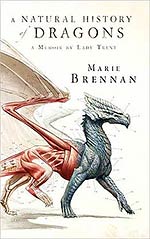
![]() nightxade
nightxade
9/12/2014
![]()
This book was not exactly what I expected. That is to say, there isn't a lot about dragons, much less their history. I was expecting something that could almost be an accompaniment to His Majesty's Dragon, and, if I wanted to get my headcanon on, I could manage a good mash up, with this book being like a prequel where Lady Trent and her ilk are learning about the enigmatic creatures. But alas, this is actually a memoir *of* Lady Trent, by the lady herself. Which isn't necessarily a bad thing, but if you're looking for dragons, they be not really here.
Instead, we get a look into the life of a young woman with an insatiably curious scientific mind that takes particular interest in the insect-like sparklings in her backyard. These tiny creatures would be the instruments of her fate in many ways, first sparking her interest in dragons, and later inspiring her continued research that leads her and her husband across the world to find real live dragons.
I've mentioned a few times now that I am steadily growing tired of speculative media where women are the inferior of the species, but sometimes, despite my misgivings, I can appreciate a book that sticks to this concept if it is done well. Most often, such stories are written by women, with Lois McMaster Bujold, being the most prominent example that springs to mind. Actually, prior to reading this book, Bujold was the only author I consider to write underprivileged women well, by showing how they understand their role as lesser beings, and work within it to achieve their goals and prove themselves, and are respected by men who aren't bound to their society's close-minded views. Brennan allows Isabella Trent to speak plainly about the role of females in society, though Isabella does not necessarily rail against it. She simply realizes that her passions do not coincide with societal norms for her sex. Fortunately, she is loved and respected by men who will not simply indulge her desire for knowledge, but encourage and enable it.
A recent essay by a young girl who lauds the character of Hermoine Granger from the Harry Potter series, speaks about how Hermoine's skill and intelligence is what is respected about the character, without her ever needing to play the damsel in distress to get the boys to help her out. Isabella has to struggle a bit to make the men in her life understand how important her study of dragons is to her, but once they do understand, they quickly respect her for her intelligence and consider her their equal in as much.
In terms of the dragons, as I mentioned, we don't see much of them, even during the pivotal and climactic moments. But I liked the way Brennan maintained Trent's critical and scientific mind when the dragons are present--especially at a particularly critical moment. It makes her seem emotionally detached from everything and everyone else, but this too is addressed well by Brennan, and when Isabella does allow herself emotions, I found it to be very moving. In fact, I was surprised by my reaction to the ending. I had not quite realized how deeply I had become involved.
I give some credit there to Kate Reading, whose narration, as always, is impeccable. She gives such nobility, humility, dignity and strength to the women she narrates.
I also liked Isabella's relationship with Dagmira, the irascible maid servant assigned to her when she travels across the world to study dragons attacking Dagmira's village. It is an atypical relationship that never quite reaches the point of friendship, though grudging respect creeps in from time to time. It is a refreshing and sometimes amusing companionship.
The political intrigue and illegal comings and goings that eventually take over the plot in the second half of the book are the story's only flaw. It all works, and thankfully does not slow anything down, but at times, the connection to the dragons feels a bit tenuous and forced. When things turn in this direction, the lack of dragons becomes more glaring.
Still, a very enjoyable read, and an unusual take on 'history' and science that brings dragons to life.